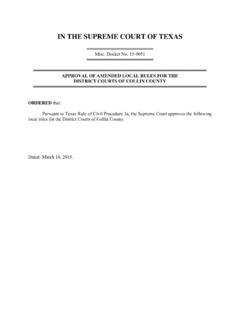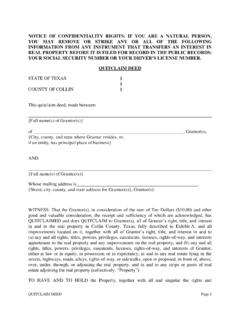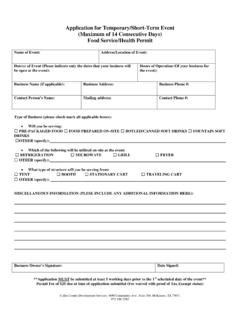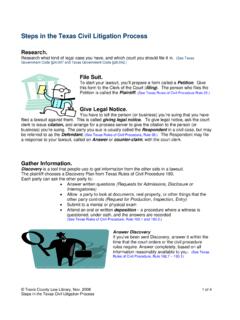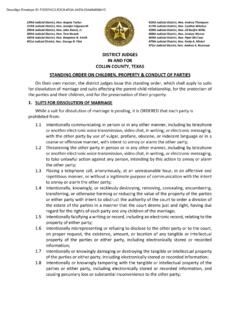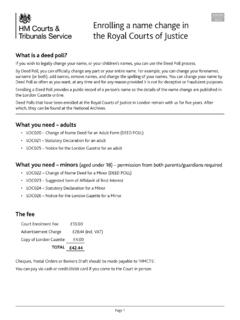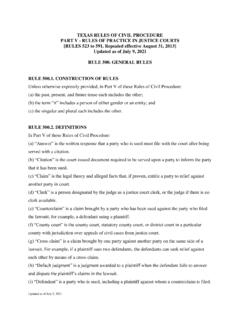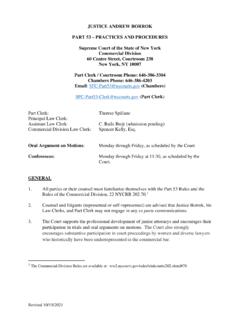Transcription of Collin County Justice Courts
1 Collin County Justice Courts Justice of the Peace Precinct 1: Judge Raleeh Justice of the Peace Precinct 2: Judge Shaffer Justice of the Peace Precinct 3: Judge Missildine Justice of the Peace Precinct 4: Judge Yarbrough Filing a Small Claims Case Self-Help Legal Information Packets are provided for the benefit of Justice Courts and individuals seeking access to Justice through the court system. They do not constitute legal advice, and the court is not responsible for the accuracy of the information contained in the packet. What is a Small Claims Case? When a person or company feels like someone else owes them money or has personal property that belongs to them, they can come to Justice court and file a lawsuit called a small claims case. The person or company who files the case is called the plaintiff and the person or company they file the case against is called the defendant.
2 What Can I File a Small Claims Case For? You can file a small claims case if you have a claim that is within the Justice court 's jurisdiction, meaning the type of cases that court can hear. The four most common reasons that plaintiffs file small claims cases are: 1) The defendant made a promise and then didn't honor the promise, which caused the plaintiff to lose money (breach of contract);. 2) The defendant owes money to the plaintiff and will not pay;. 3) The defendant did something that caused damage to the plaintiff's property or caused injury to the plaintiff; or 4) The defendant is in possession of personal property that belongs to the plaintiff. What Can I Not File a Small Claims Case For? You cannot file a small claims case if: 1) The amount of money you are trying to recover is more than $20,000, 2) You are trying to recover a piece of personal property that is worth more than $20,000 (a hearing may be necessary 1.
3 After you file a case for the judge to determine if the property is worth more than $20,000), 3) You are trying to recover or obtain title to real property (land), or 4) You are suing for defamation, libel, or slander (things the defendant has said or published about you that you believe to be false and harmful). You also cannot get an order from a Justice court to make a party do something or stop doing something. For example, you could not get an order from the Justice court to make the defendant perform services that you paid for but didn't receive, stop posting things about you on Facebook, or cut down a tree that is hanging over your property. Who Do I File a Small Claims Case Against? You must file the case against the person or company that is responsible for your damages (lost money) or that has your personal property. If you are suing a business that is not a corporation, you should check with the County clerk to see who the owners or partners of the business are.
4 If the business is a corporation, you will need the name of the registered agent, president, or vice-president of the corporation. To determine the legal nature of a business, you may: 1) Go to the Assumed Names Records maintained by the County Clerk 2) Contact the Corporation Division of the Office of the Secretary of State at 512-463-5555, or go to their web page at , to find information and assistance, or 2. 3) Contact the Office of the State Comptroller at 1-800-252- 1386. When Can I File a Small Claims Case? You can only file your claim for a certain amount of time after the incident occurs. This is called the statute of limitations. In a breach of contract case, the time period is four years, unless the contract gives a different time period. In most other cases, the time period is two years. If you file a case where the statute of limitations has run out, you will lose the case.
5 If you are unsure if the statute of limitations has run out in your case, you may wish to consult an attorney. Where Do I File a Small Claims Case? Small claims cases are filed in a Justice court and the case will be heard in front of the Justice of the peace. You can technically file the small claims case in any Justice court in Texas. However, if you file in the wrong venue (location), the defendant can have the case moved to the right location. If that happens, you may have to pay the filing fees again, so it is a good idea to file the case in the right venue to start with. So, what is the right venue? Generally, a case can be filed: 1) In the precinct and County where the defendant lives, 2) In the precinct and County where the contract was going to be performed, if it is a contract case, 3) In the precinct and County where the damage to property or injury to the plaintiff occurred, or 3.
6 4) In the precinct and County where the personal property the plaintiff is suing for is located. How Do I File a Small Claims Case? The first step in filing a case (unless you are suing a doctor for medical malpractice, in which case you should consult with an attorney) is to file a petition, which is a form that says who you are suing, why you are suing them, how much you are suing them for, and provides contact information. The court will likely have petition forms for you to use. When you file the petition, you will have to pay a filing fee. Also, the petition and citation (the notice from the court to the defendant that they have been sued) must be served on (delivered to) the defendant. This can be done in person or by certified mail or registered mail, and if it is done by mail there must be a return receipt requested, with restricted delivery.
7 IMPORTANT - You are not allowed to serve the paperwork yourself! You can either hire a private process server to serve the paperwork, or pay for the constable, sheriff, or clerk of the court to serve the paperwork. The fee for this service varies from County to County , see the court for details. If you win your case, you will be awarded the fees that you had to pay, in addition to any other money you are entitled to recover. 4. What if I Can't Afford to File a Case? Courts must not deny you access to Justice simply because you cannot afford filing fees or service fees. If you are unable to pay those fees, fill out a Statement of Inability to Afford Payment of court Costs form the court must provide this form to you. You must swear to the information that you provide on this form and can face legal consequences if you do not fill it out to the best of your ability.
8 Fill out the form completely and truthfully! Do I Need a Lawyer to File a Case? While you are allowed to have a lawyer in a small claims case, the rules and procedures are designed to be simple and straightforward, allowing people to seek Justice without needing to hire a lawyer. If you do not have a lawyer, the judge may allow you to be assisted in court by a family member or other person who is not being paid to assist you. This person can help you understand the proceedings and advise you, though that person cannot speak for you in court . The court is required to make the Rules of Civil Procedure available to you at no cost. Rules 500-507 are the rules that specifically apply to small claims cases. The court is not allowed to give you advice on whether you will win a case or not, whether you should file a case, who you should file a case against, or what steps you should take to win your case or collect your judgment.
9 5. Questions the court can answer for you are questions like What do I need to do to have a jury trial? or How many days do I have to file an appeal? . Questions the court cannot answer for you are questions like Can I sue someone for this? or Who should I sue? or Is it a good idea to get a jury for this case? or Am I going to win? . If, after reviewing these materials and the rules for small claims cases, you still are not sure what to do, it may be best to consult an attorney. What Happens After I File a Small Claims Case? IMPORTANT - Make sure to keep your address updated with the court and the other party so that you will receive any paperwork or notices sent to you. The court will generate the citation, which tells the defendant that they are being sued. The citation then must be served on the defendant. You can either pay the service fee for the constable or sheriff to serve the citation (or submit a Statement of Inability showing you cannot afford the fee) or hire a private process server to serve it on the defendant.
10 Once the defendant is served with the citation, they have 14 days to file an answer, which is their response to your lawsuit. They are required to send you a copy of their answer. If the defendant does answer, the court will set your case either for trial or for a pre-trial hearing. At a pre-trial hearing, you can discuss any issues such as the need for an interpreter, or for the court to subpoena a witness (order them to come to trial to testify). 6. What if the Defendant Doesn't Answer? If the defendant doesn't file an answer within the 14 day period, you can ask the court for a default judgment hearing, where you can prove to the court that you are entitled to money or personal property and be awarded a judgment. To get a default judgment, you will also need to provide the last known address of the defendant to the court in writing, as well as an affidavit (document signed in front of the clerk or a notary, that you swear to be true) stating either: 1) the defendant is on active duty in the military, 2) the defendant is not on active duty in the military, or 3) that you do not know if the defendant is on active duty in the military.
